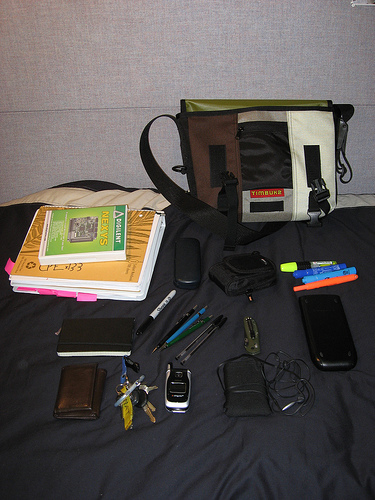The technology-related cost of going to school

Tools and ideas to transform education. Sign up below.
You are now subscribed
Your newsletter sign-up was successful
According to an article in the Daily Telegraph, it now costs £550 for a child to go to school, compared with around £230 in the 1960s and £250 in the 1980s. This is because of the number of gadgets included in the pupil’s school bag, compared to earlier times. The article says:
Today, while the cost of lunchboxes, calculators, and pencil cases have come down, the rise in demand for technology means parents face having to find a small fortune for the Back to School rush.
What a ridiculous, non-news article!
Are these sorts of comparisons meaningful? And is that conclusion, that parents have to find a small fortune. legitimate?
What's in my school bag? Photo by Nat Welch http://www.flickr.com/photos/icco/

Here are my objections to the article:
- The biggest single item mentioned is a smartphone. Well, kids don’t have to have them. And even if they or their parents think they do, the reality is that in most schools they have to switch them off as soon as they walk through the school gate. So this is not a school-related expense at all.
- Most schools that want pupils to have a device like a tablet have means whereby they can help those parents who can’t afford to buy them.
- It is completely illegitimate to compare two such different “baskets of goods” in terms of prices. E-readers and smartphones didn’t exist 30 and 50 years ago.
- Even if you think such comparisons are ok, is the apparent doubling of cost real? A much more important measure, in my opinion, would be how long it took someone to earn the money to buy those things. Textbooks, which are one of the few items that are common to all the years compared, now cost much more than they used to, in financial terms. However, my recollection is that when I was at school in the 1960s we, as an average family, could not afford many textbooks, and we relied on the school to provide them.
- I also think there is an issue of quantity: one of the items mentioned is an e-reader. Well, you can have hundreds of textbooks on an e-reader, which with any luck the school will provide.
- And there is a matter of quality of life: carrying around an e-reader or tablet or smartphone is a lot easier and healthier (as far as backs are concerned) than lugging textbooks around.
The statistics were provided by the retailer John Lewis. I have a lot of time for John Lewis: their service is excellent, and the quality of the stuff they sell is great. But I can see no point in this news release apart from serving to advertise John Lewis.
Tools and ideas to transform education. Sign up below.
Well, I suppose that’s fair enough, as long as we don’t take any of it too seriously. The trouble is, though, people do, and none of the news articles I’ve looked at questions the legitimacy of this research. In the This Money article (see under “Related articles”, one parent is quoted:
Unsurprisingly, cash-strapped parents are questioning why gadgets are necessary. Mother of three Maria Dawson, 42, from Southampton said: 'Two of my children have smartphones and that means they are taking hundreds of pounds worth of equipment to school.
'All of their friends had them and, children being children, that meant they were constantly asking for them so they would be up to date.
'In all honesty, I’m not sure why children aged 12 and 13 need to take a phone worth hundreds of pounds to school - I do worry about them getting lost or stolen.'
Well, they don’t need to take phones with them to school!
I do find it tedious to constantly read criticism or implied criticism of schools when it is completely misplaced. Sigh. Perhaps it’s best just to ignore it.
cross-posted on www.ictineducation.org
Terry Freedman is an independent educational ICT consultant with over 35 years of experience in education. He publishes the ICT in Education website and the newsletter “Computers in Classrooms."
